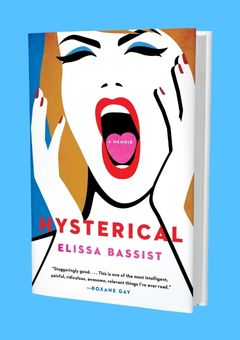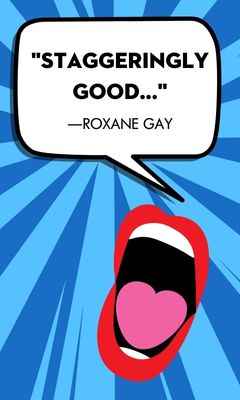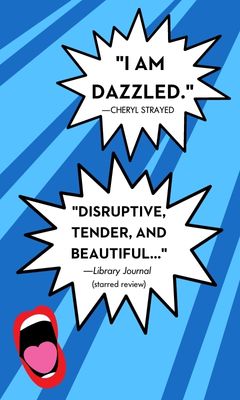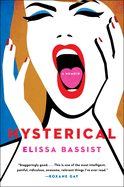Hysterical
by Elissa Bassist
Spanning the literary spectrum from intimate memoir to spirited manifesto, Elissa Bassist's outstanding debut, Hysterical, finds the essayist, editor and writing teacher directing her formidable intellectual energy, superb wit and startlingly honest writing style toward a courageous, impassioned reckoning with American patriarchy and the cultural forces working in tandem to suppress women's voices at the expense of their physical and mental health. Bassist spent years being silenced by men, followed by self-silencing out of fear of being dismissed as hysterical or labelled a "crazy psycho bitch." Now she unapologetically speaks out, joining forces with feminist thinkers past and present to challenge the rampant sexual violence, unexpressed trauma and marginalization that often result in unexplained illness and chronic pain in women.
Rich with social and psychological insights, Bassist's original, fearless prose is fortified by the writings of women she admires. Adrienne Rich, Larissa Pham, Susan Faludi, bell hooks, Anne Carson and Soraya Chemaly are some of the voices amplified as Hysterical interrogates the cultural reality of contemporary America as a place where it is expected that "men speak and women shut up." Part of a literary cohort of authors such as Roxane Gay and Sarah Ramey who skillfully blend storytelling, humor and grace in their feminist writing, Bassist addresses a lifetime's worth of challenges, including extended physical illness, obsessive-compulsive disorder, a teenage protégé's suicide, working with difficult, powerful men and the battle to reclaim her voice.
Bassist acknowledges at the outset that patriarchy is "our mother tongue and our preexisting condition." Not only do we live in a patriarchy, she explains, it also lives in us. Erasing it will involve radically altering every aspect of American culture, including the way women see themselves. Television played a significant part in the author's upbringing, and she accepted what she saw on the screen, including the lie that girls' bodies are for giving and their sexuality isn't for them. "I devoured and digested the role of Woman whose life hinges on her sexuality and whose love takes the form of mute devotion, and I regurgitated it," she confesses. The cultural messages she absorbed taught Bassist her worth was directly connected to her desirability by men.
As she developed her adult identity, Bassist trained her voice to be more attractive to men, "a combination of high pitch, vocal fry, uptalk, and broken sentences that curled." A virgin in college, she had a vision of how her sexual debut would unfold, based on the media she consumed. The reality was far more cruel. She shares powerful narratives of her sexual awakening in the chapter "Why I Didn't Say No," recalling how sex was violent and intensely painful. For this she was accused of overreacting, being dramatic and acting crazy. Despite the pain, she didn't question her boyfriend's aggression, wanting him to love her. "The disease to please is our birth defect," she admits. Abusive sex caused a rupture in her cervix as well as in her traumatized psyche. Sex became associated with pain and led to years of celibacy.
In the chapter "Must-See Dead-Girl TV," Bassist skillfully examines one of the fundamental pillars of contemporary patriarchy: the normalization of rape and other forms of violence toward women in film and television. It is considered art, she points out, when men write, direct, produce and edit scenes of extreme violence against women in session after session of "pain karaoke." Gender-based violence often ignites the plot and fuels the dialogue of the shows we watch. By some estimates, the immensely popular TV show The Game of Thrones features 50 acts of rape. Exposing her own culpability, Bassist asks, "What happens when women's subjugation and suffering are the things we like to binge?"
Central to the theme of Hysterical is the reality that women who speak out are labeled as crazy because, Bassist concludes, it doesn't take much for a woman to be "too much." The word hysterical is used dismissively to describe "over-dramatic, attention-seeking people with uteruses who have too many volatile feelings and lie about their bodies hurting," while the label "crazy psycho bitch" is too easily applied to socially inconvenient female behavior. Intensely fearful of being labeled, Bassist was careful around her male bosses as she launched her literary career, suppressing her moods, sorrows and her personality to avoid provoking or inconveniencing the men she worked for.
Years of subduing her voice, saying yes when she wanted to say no, and an accumulation of unexpressed trauma led to mysterious physical maladies even the experts could not diagnose, and the life-altering challenges of obsessive-compulsive disorder. Remarkably, therapeutic writing, or writing with "maximum emotional voltage," has been shown to reduce health problems and doctor visits. For the author, harnessing the power of language to express herself helped to release her "caged fury" and eventually to resuscitate her voice.
In an impactful final chapter on "Reclaiming Women's Voices," Bassist writes that "it wasn't ever my voice that would obliterate me. It was my silence." For readers who engage with Bassist's charismatic writing and embrace its revolutionary cultural scope, there will be no going back to patriarchy-as-usual. --Shahina Piyarali








